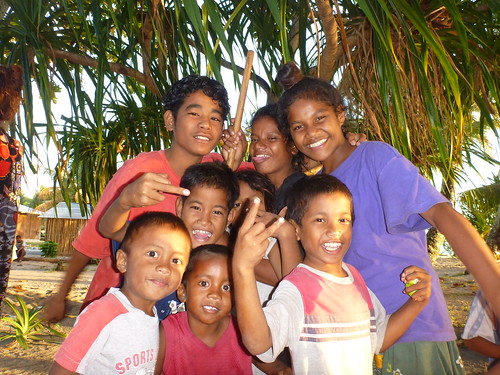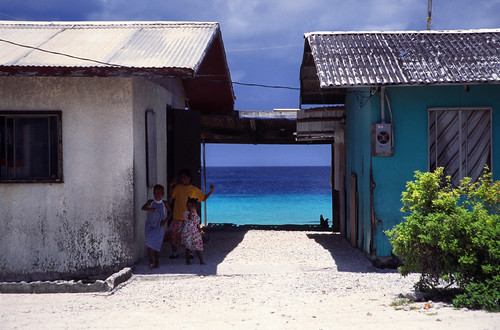Adopting from Marshall Islands
Contents
Hague Convention Information
Marshall Islands is not a party to the Hague Convention on Protection of Children and Co-operation in Respect of Intercountry Adoption (Hague Adoption Convention). Intercountry adoptions of children from non-Hague countries are processed in accordance with 8 Code of Federal Regulations, Section 204.3 as it relates to orphans as defined under the Immigration and Nationality Act, Section 101(b)(1)(F).
Although the “Compact of Free Association” between the Marshall Islands and the United States permits Marshallese citizens to travel to and live in the United States without a U.S. visa, this provision is not applicable to adopted children who will reside permanently with U.S. families in the United States. Prospective adoptive parents of Marshallese children must go through the appropriate Marshallese adoption procedures as well as the relevant U.S. immigration procedures related to adopted foreign orphans. Adopted Marshallese children who enter the United States without a visa may later have difficulties adjusting their U.S. immigration status and, eventually, acquiring U.S. citizenship.
Prospective adoptive parents should either plan to remain in the Marshall Islands for approximately four to five weeks before returning to the United States with the child or plan to make two separate trips, the first to complete the local adoption process and file the child’s Form I-600 petition and DS-260 immigrant visa application and the second to receive the approved immigrant visa for the child and bring him or her home. The U.S. Embassy in Manila, Philippines adjudicates and issues immigrant visas for children adopted in the Marshall Islands and delivers them to the U.S. Embassy in Majuro. Prospective adoptive parents should not make non-refundable travel plans prior to receiving all necessary documentation and immigrant visa(s) for the adopted child(ren). For more information, please see the ‘U.S. Immigrant Visa’ section below.
U.S. IMMIGRATION REQUIREMENTS FOR INTERCOUNTRY ADOPTIONS
To bring an adopted child to the United States from the Marshall Islands, you must meet eligibility and suitability requirements. The U.S. Department of Homeland Security, U.S. Citizenship and Immigration Services (USCIS) determine who can adopt under U.S. immigration law.
Additionally, a child must meet the definition of orphan under U.S. immigration law in order to be eligible to immigrate to the United States on an IR-3 or IR-4 immigrant visa.
Who Can Adopt
In addition to U.S. immigration requirements, you must also meet the following requirements in order to adopt a child from Marshall Islands:
Residency
The Government of the Marshall Islands has no specific requirement or policy regarding the citizenship or residency of foreign prospective adoptive parents
Age of Adopting Parents
Any person 18 or older can petition to adopt a child; however, the petitioner must be at least 15 years older than the child to be adopted.
Marriage
Under Marshallese law, both married couples and single individuals may adopt Marshallese children. Marshallese law does not permit same-sex couples or individuals in same-sex relationships to adopt.
Income
There is no minimum income requirement for adoptive parents.
Other
Prospective adoptive parents must have a home study completed by a U.S. state licensed adoption agency. This can be the home study that U.S. prospective adoptive parents submit to USCIS as part of their Form I-600A filing. The home study must include the following:
- 1. Educational background and future educational plans;
- 2. Employment history, current status and any changes in the foreseeable future;
- 3. Income history and future projections, if available;
- 4. History of prior marriages, if any, including the basis for divorce, the age and gender of each child, the history of child support for and current relationship with those children;
- 5. History of current marriage, age and gender of each child already in the home, and detailed report of any prior adoption experiences;
- 6. Participation in any civic or religious activity of prospective parents;
- 7. Nationwide criminal background search in the prospective adoptive parent'(s) country of residence or country of citizenship; and
- 8. Original child abuse records search.
Who Can Be Adopted
Marshall Islands has specific requirements that a child must meet in order to be eligible for adoption. You cannot adopt a child in Marshall Islands unless he or she meets the requirements outlined below.
Relinquishment: The Central Adoption Authority ("CAA"), a governmental office in the Ministry of Internal Affairs, oversees the adoption process. The CAA oversees the execution of an "Affidavit of Relinquishment of Parental Rights and Consent to Adoption and Emigration" by the birth parent(s). No final adoption hearing can occur until at least 30 days have elapsed since the signing of the Affidavit of Relinquishment.
In most relinquishments, birth mothers do not identify the father and no male has claimed paternity of the child.
Abandonment: Under Marshallese law, "abandonment" means the failure to provide financial support for the child; or knowingly failing to provide a normal parent-child relationship with the child for a period of six or more months and deliberately failing to arrange for the provision of care and supervision of a child by another adult or adults who are willing and able to care for the child.
Age of Adoptive Child: No child 16 years of age or older may be adopted. The Court will consider the objection of a child 12 years of age or older to be controlling and the adoption will not proceed. A child under 12 years of age may object, however, the child's objection is not controlling. The Court will determine whether the adoption is in the child's best interest.
Sibling Adoptions: There are no specific eligibility requirements
Special Needs or Medical Conditions: There are no specific eligibility requirements.
Waiting Period or Foster Care: In relinquishment cases, the High Court hearing to petition for adoption may not occur before 30 days have passed since the birth parent(s) signed the Affidavit of Relinquishment.
How to Adopt
Adoption Authority
The Process
Traveling Abroad
After Adoption
SOURCE
Intercountry Adoption, Bureau of Consular Affairs. U.S. Department of State Country Information










